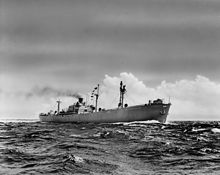World War II
International Freighting Corporation was active with charter shipping with the Maritime Commission and War Shipping Administration. During wartime, the International Freighting Corporation operated Victory ships and Liberty ships. The ship was run by its International Freighting Corporation crew and the United States Navy supplied United States Navy Armed Guards to man the deck guns and radio. The most common armament mounted on these merchant ships were the MK II 20mm Oerlikon autocannon and the 3"/50, 4"/50, and 5"/38 deck guns. [5] [6]


Victory ships
Liberty ships
- Caesar Rodney
- Sonata [7]
- Albert K. Smiley
- James Longstreet
- Sallie S. Cotten
- Equipoise, sunk by torpedo 27 March 1942
- Reginald A. Fessenden [8]
- Roger Williams [8]
- Nicholas Biddle
- Sarah J. Hale
- Ruben Dario [8]
- Nathaniel Bacon [9]
- Ole Bull [9]
- Mary Ashley Townsend [10]
- Milton J. Foreman [10]
- Edwin L. Drake [11]
- Ernest W. Gibson [11]
- Ezra Weston [11]
- John G. Tod [12]
- Banner Seam [13]
- Lyman Abbott [14]
- William S. Halstead [15]
- William Wirt [15]
- Albert K. Smiley [16]
- Andrew A. Humpreys [16]
- James D. Trask [17]
- James Longstreet, ran ashore off New Jersey at 40.27N 74.00W on October 27, 1943, later refloated and sank as gunnery target. [17]
- James D. Trask [17]
- John A. Poor, was sunk by torpedo by U-510 in the Indian Ocean at 13.58N 70.30E on March 19, 1944 [12] [18]
